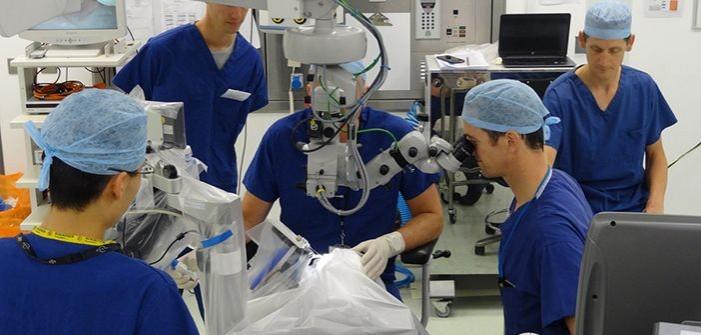
Robots have already become a support to the doctors in several medical procedures such as a prostate surgery or a gallbladder operation. Now, they have made a progress and the robots are going to operate humans' eyes.
University of Oxford's Nuffield Department of Clinical Neurosciences' researchers had initiated a clinical trial in 2016 to assess a robot, named PRECEYES Surgical System. PRECEYES has been specially designed to perform surgery on the retina of our eyes. Now, the group of researchers has published the result of their two-year-long trial.
As per the research paper published in Nature Biomedical Engineering, PRECEYES system is capable of holding several medical instruments in its mobile arm and the surgeons will have to control that with the help of a joystick. Since the system is robotic, it eliminates even the slightest possibility of tremors.
During the trial, the researchers had enlisted twelve patients, who all required a membrane to be removed from their retinas. It's actually quite a common procedure, notes the paper. While the doctors performed six of the surgeries in the usual way; others underwent a PRECEYES-assisted operation. All of the surgeries were successful. In certain cases, the robot made the doctors more efficient, stated Oxford University.
In the next phase, the surgeons made use of the robot for three surgeries, where it had to dissolve under-retina hemorrhages, which could have caused complete blindness in the patients. These procedures were successful, too.
The robot-assisted procedures took three times more time than the usual one and that's because the surgeons are not familiar with how to move the robot, so they moved it with caution, the chief researcher of the trial, Robert MacLaren told New Scientist.
"Our next step will be to use the robotic surgical device for precise and minimally traumatic delivery of a gene therapy to the retina, which will be another first-in-man achievement and is set to commence in early 2019," stated MacLaren.
Past eye surgeries by robots
In January, surgeons of University Hospitals Leuven have operated on a patient with retinal vein occlusion using a surgical robot, which used a needle of barely 0.03 millimetre to inject a thrombolytic drug into the retinal vein of the patient.
KU Leuven (University of Leuven, Belgium) developed the robot and needle specifically for this procedure, known as retinal vein cannulation (RVC), a treatment that addresses the retinal vein occlusion by removing the blood clot in the retinal vein. Figures show that, worldwide there are 16.4 million people with a blocked retinal vein caused by thrombosis in the blood vessel.

















